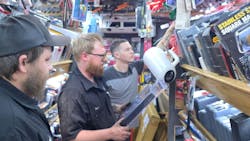After 30 years in the industry, independent distributor Brian Deakins is no stranger to the world of automotive. On his route just outside of Charlotte, North Carolina, Deakins makes the usual stops at auto body shops, but he’s been lucky enough to slip into many different industries as well. From motorcycle shops, truck modification shops, boat repair shops, Department of Transportation (DOT) garages, and more, Deakins has stepped up and out, maximizing the potential of his business in the process.
While it may seem like no small feat, you might not realize how well-positioned your own business is to start taking on non-automotive customers.
Right place, right time
About 15 years ago, Deakins had to essentially start over after moving from California to North Carolina. To establish a route in his new territory, he stopped at different shops to get a lay of the land. When it came to gaining business, it was a balance of putting himself out there and being open to new opportunities.
“I just started driving around, and I’d pull into shops,” Deakins says. “Then other times there’d be people somewhere, they’d see me and ask me to come by, like with the DOT garage. I didn’t know where that was, but they saw me somewhere and stopped me and asked me to come over. It goes a little bit of both me pulling in or somebody asking me to stop by.”
Deakins knows exactly how it feels to pivot into new industries. Before becoming a tool distributor, he worked as an aircraft technician for 12 years. By connecting with his customers, Deakins opened up opportunities for different businesses to seek his services later on.
It might not be as simple as having potential customers approach you; it certainly wasn’t always that simple for Deakins. Sometimes, you’ll have to put in the extra effort to find those new industry opportunities. Victor Rivilla, marketing director at CanDo International, suggests using the internet and doing your own research to find out what shops are in your area and who might be a good fit for your business.
“The easiest approach [to expand into other industries] is to use the internet to scour these new types of industries that are in your area, gather all their addresses, and personally pay them a visit with marketing, collateral, and samples that cater to that business,” Rivilla says. “Demonstrating how a tool can save time and money almost always closes the deal and gets the dealer a new customer.”
Chances are that you might be the only tool distributor that stops at these places since so much of the focus is on automotive shops for many distributors.
“Just go in there and ask the question is the biggest advice I would give,” says David Goodman, marketing director at Cutting Edge Automotive Solutions (CEAS). “They couldn’t be happier to see you because they’re sort of the forgotten people, marine and motorcycle shops, in both parts of these industries.”
Using what you have
You might not realize it, but you probably already have a handful of tools sitting on your truck right now that someone working on aircraft, boats, city buses, or even tractors could find useful for their shops.
Diagnostics
One of the most versatile products you can keep on your truck is diagnostic equipment. For any kind of vehicle, from motorcycles, cars, and trucks to tractors, boats, and buses, diagnostics play a key role in the repair process.
“Diagnostics help us to get into those other shops and help the distributors diversify by being able to visit motorcycle body shops and things like that,” Goodman says.
Thermal imaging cameras play an emerging role in many different industries, according to TOPDON’s marketing director, Justin Herald. These products help to diagnose engine issues and leaks and can play a pivotal role not only in passenger vehicles but in commercial and heavy duty as well.
“Thermal cameras are probably one of the biggest opportunities that we see. There’s so much crossover in industries to be able to use it,” Herald explains. “That was a product [that] for the longest time was priced out of most people’s budget, and the technology of that has come down drastically in price. It can be a great diagnostic tool no matter the industry you’re in.”
For many diagnostic tools, particularly scan tools, switching the software to specialize in motorcycles instead of cars, for example, can be as simple as downloading additional software. Two of the models TOPDON offers, the Phoenix Max and Phoenix Smart, offer full OE-level diagnostics for automotive, but technicians can add heavy duty capabilities with a yearly fee.
CanDo offers scan tools that can both read and clear codes on passenger vehicles and light trucks, but also diagnose motorcycles, ATVs, snowmobiles, and more, without the need for extra equipment or software.
“We have our MOTO Pro and MOTO Mini scan tools that cater to the motorcycle and powersports markets,” says CanDo’s Rivilla. “Our tools are all-inclusive, so there is no need to add additional software suites or cables.”
Battery starting/charging
In the same vein as diagnostic equipment, if you’re considering branching out to other industries, TOPDON’s Herald suggests looking no further than the battery products you keep stocked on your truck. Every vehicle on the road is powered by some kind of battery, and inevitably, at some point in that battery’s lifetime, it will need work done on it.
“Battery chargers, jumpstarters, tests, any of that kind of [product], plays a part in most industries,” Herald says.
When it comes to using a jumpstarter for, say, a heavy duty truck or farming equipment, chances are you’ll need something with a little more power to it. Amongst TOPDON’s jumpstarter offerings is the V4500 Plus jumpstarter, which is built for professional and heavy duty vehicles.
“There is a lot of overlap from the automotive guys,” CEAS’s Goodman says. “The diesel guys are going to need the same thing, they’re just going to need a size bigger.”
For some industries, it can be as simple as just buying a larger size or higher amperage. It takes away a little bit of the headache that can come from trying to learn the intricacies of a new field and gets you closer to making that sale.
Hand tools
Hand tools have a lot of versatile functions, making them valuable in more than just the automotive field. While the function and purpose of a car is undoubtedly different from that of a tractor or garbage truck, they all still carry bolts, fasteners, and many of the same small elements that keep them from falling apart. This is where hand tools come into play.
“Most of the stuff I’m selling day-to-day is hand tools, cordless tools, torque wrenches, which all translates to every industry,” Deakins says. “It’s pretty much the same, just some on a different scale.”
If you’re hoping to add farms to your route, it’s a good idea to add sockets and wrenches in some bigger sizes. In addition to their standard automotive tooling, CEAS also goes up to 2-1/2” drive, 200mm sockets.
“They’re massive, 40 to 50-lb sockets,” Goodman explains. “We cover automotive and heavy duty, but also all the way up into major industrial sizes as well.”
By finding a new spin for the products already on board your truck, you position yourself to save money in the process of making it. Don’t sell yourself short; breathe new life into your existing inventory.
Stocking what you don't have
One of the biggest challenges a distributor can face is how to organize their truck. Deakins doesn’t separate products based on industry, but he does keep in mind the space he takes up.
If you’re thinking about adding heavy duty shops to your route, maybe consider keeping a couple of larger pieces of equipment, like jack stands. These products can take up a lot of space, so keep that in mind when stocking them. They can also be expensive. Rivilla advises investing in the tools and the humans that use them. The payoff can be great.
“I try to have as much inventory as I can,” Deakins explains. “I hate not having something when somebody needs it.”
Even when servicing automotive shops, you might not always have everything a shop needs every time you visit them. When that happens, Deakins tries to keep an open line of communication with his customers so that if they don’t see something on the truck, he can order it for them and even have it drop-shipped to their shop.
Maximizing your business
Expanding into non-automotive market sectors can have a lot of benefits for your tool business. Perhaps one obvious benefit of reaching non-automotive sectors is the increased business you’ll receive. By selling at shops that service heavier equipment – tractors, buses, boats – you’re more likely to land bigger sales more frequently. The technicians at these shops are less budget-oriented and may not be as impacted by economic recession, according to CanDo’s Rivilla.
“For those that are working in commercial vehicles, money isn’t as big of an object as it is for people that are using a [vehicle] for their regular commute,” CEAS’s Goodman explains. “The industrial space and heavy duty off-highway, those are commercial, so people are using that for business. It’s less about, ‘How much is this going to cost me?’ and more about, ‘How fast can you have this fixed so that I can continue to do my business as usual?’”
Aside from the customers and the increased revenue you’ll generate for your business, by stopping at these places you might not have considered, you’ll open yourself up for networking opportunities with additional technicians.
“Once you get into certain industries and niches, these guys all talk to each other,” TOPDON’s Herald says. “So if you could be successful with one, I think your name’s going to get around to these other guys.”
The repair industry as a whole is big, covering several different specialties, but when it comes to the area you service, it can feel pretty small. Staying consistent has been a huge tactic for Deakins’ business and an effective way to gain customers.
“I show up every week at the same time, at the same day,” Deakins explains. “One of the trash companies I go to, they have three or four technicians, but there are a lot of people that work there, so I’ll get additional business from other customers or employees that are there, not [just] technicians.”
The biggest advice Deakins has for distributors looking to expand their business is to not take things for granted. If you see a shop in your area, don’t be afraid to step outside of your comfort zone and take a chance. Stop by and see if there’s something they might be able to use on your truck.
“See what happens before you discount it,” Deakins advises. “There’s definitely no harm in trying.”
About the Author
Elli Carder
Assistant Editor | PTEN & Professional Distributor
Elli Carder is an assistant editor for Endeavor Business Media's Vehicle Repair Group. With a background in professional and creative writing, Carder helps edit for both Professional Tools and Equipment News (PTEN) and Professional Distributor magazines, as well as VehicleServicePros.com.
Don't miss Carder's next article. Sign up for PTEN or Professional Distributor's weekly newsletter.

